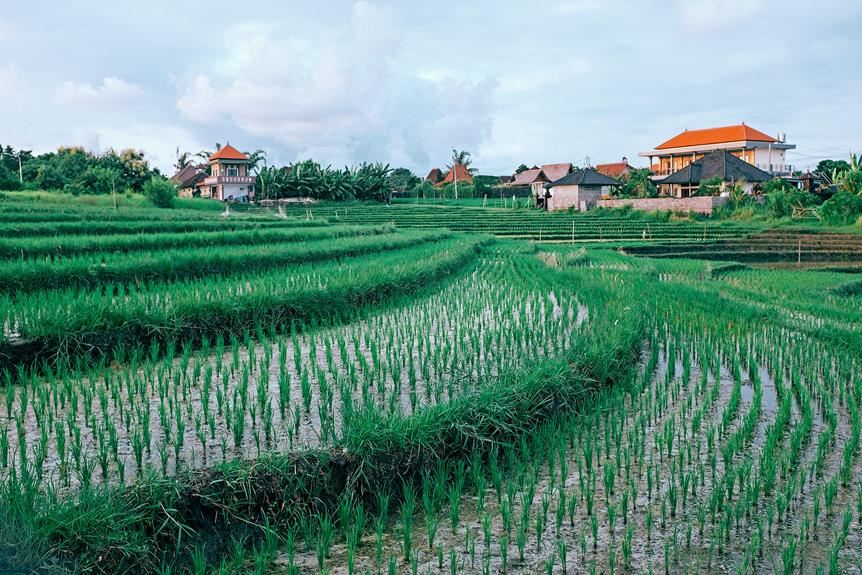Irrigation is like a lifeline for plants. It provides the nourishment and sustenance they need to thrive and bear abundant fruits.
You can benefit from irrigation in many ways: increased crop yields, reduced water waste, conserved soil fertility, and additional income opportunities.
Let's explore the advantages of irrigation in greater detail.
Benefits of Irrigation
You can benefit from irrigation by using water efficiently. Improving water quality, enhancing biodiversity, and better crop yields are just a few of the advantages of irrigation.
Irrigation systems save time and money while also allowing farmers to grow their plants in dry climates or during dry season. This helps them to increase their yields without having to worry about water scarcity due to drought.
This efficient use of resources also helps to decrease the environmental impact of agriculture. Irrigation systems provide a sustainable source of fresh water and help to ensure the food security of communities and nations.
Increasing Crop Yields
You can increase crop yields significantly with the use of irrigation.
Modern irrigation systems often include features to reduce pests, encourage more efficient water use, and enhance nutrition in crops.
This can lead to larger harvests with a higher quality crop, making irrigation a key tool for sustainable farming.
With the right irrigation system, you can use less water and still get bigger, more nutritious yields, while also conserving the environment.
Reducing Water Wastage
By using an irrigation system, you can reduce water wastage significantly. This system helps to ensure that the water is used where and when it's needed, reducing runoff and promoting water conservation.
Additionally, it allows you to control the water intake and reduce the amount of evaporation, providing more efficient use of the available water.
Regular maintenance and monitoring of the irrigation system can further reduce water wastage.
Overall, irrigation can be a great way to save water and reduce water wastage.
Conserving Soil Fertility
Using an irrigation system can help conserve soil fertility by providing the right amount of water for crops and preventing over-watering. In addition, it reduces runoff, which can improve water quality, and helps maintain the balance of nutrients in the soil.
Irrigation also helps keep weeds from taking over, and can help crops reach optimal growth. Furthermore, it ensures that crops receive the right amount of water and aren't deprived.
Irrigation is essential for conserving soil fertility and is an excellent way to achieve liberation from water wastage.
Additional Income Opportunities
With irrigation, you can create additional income opportunities by diversifying your crops. Investing in financial planning and allocating labor forces to various crops can increase your marketable yield. This can help you to make better use of your resources, and provide a means of income stability.
With proper irrigation, you can maximize your financial gains and create a more sustainable and profitable farm. It can also facilitate the growth of new crops, allowing you to access different markets and further increase your potential for financial gain.
Frequently Asked Questions
What Is the Best Type of Irrigation System for My Land?
The best type of irrigation system for your land depends on your needs. Consider water conservation and soil moisture when choosing one to maximize efficiency. Research your options to determine which works best for your area and budget. Embrace liberation by selecting the most effective system for your land.
How Much Does an Irrigation System Cost to Install?
"The cost of installing an irrigation system varies, but the energy efficiency and water conservation it offers is worth it! From old-fashioned sprinklers to modern drip systems, there's an option for every budget. Plus, you'll liberate your land from drought and your wallet from high water bills.
How Often Do I Need to Irrigate My Crops?
You need to irrigate your crops regularly to ensure water conservation and soil health. Consider factors such as climate, soil type, and crop type to determine an appropriate irrigation schedule. Be mindful of your water usage and take steps to conserve it.
What Type of Water Sources Are Suitable for Irrigation?
"You can use both surface and ground water sources to irrigate crops. In fact, figuratively speaking, they're a match made in heaven! Surface water is usually plentiful and easily accessible, while ground water is more reliable and sustainable. Both are great options to provide your plants with the moisture and nutrients they need to thrive.
Are There Any Government Subsidies Available for Investing in Irrigation Systems?
Yes! Governments often provide financial incentives and water conservation subsidies to encourage investment in irrigation systems. Check with your local authorities to learn more.
Conclusion
Irrigation is a great way to benefit both your land and your wallet. It can increase crop yields, reduce water wastage, conserve soil fertility, and open up additional income opportunities.
So, why not give it a try? You won't regret it – after all, who wouldn't want to make their land even more fruitful and their pocketbook a little fuller?
And best of all, you can do it without breaking a sweat!

